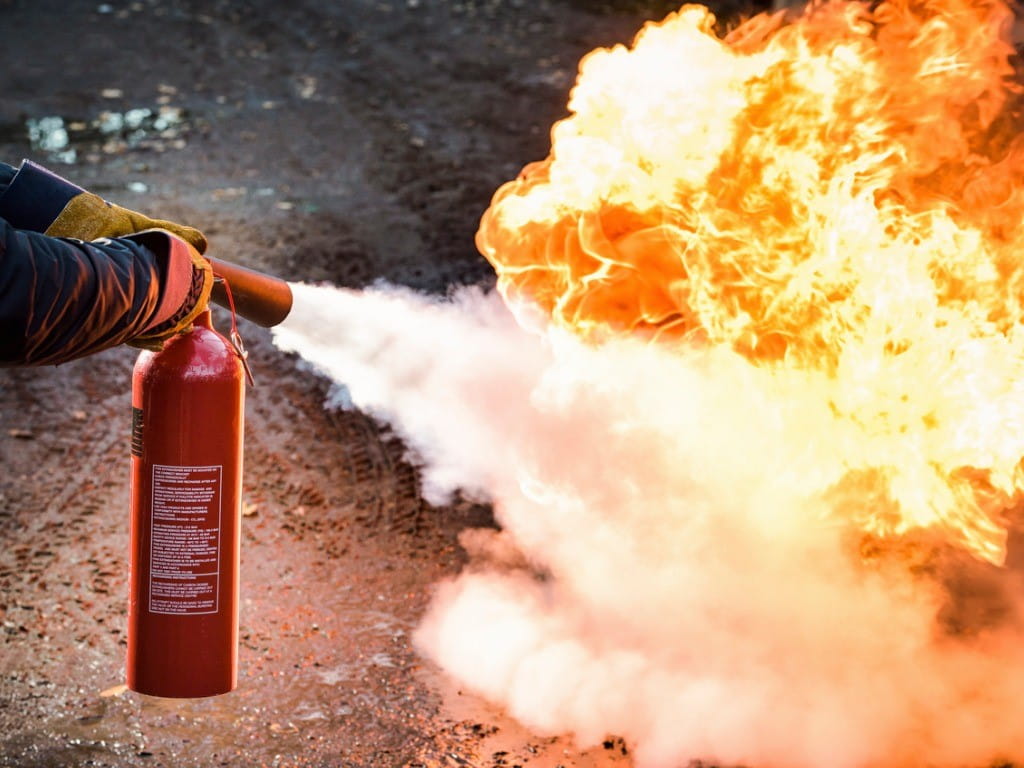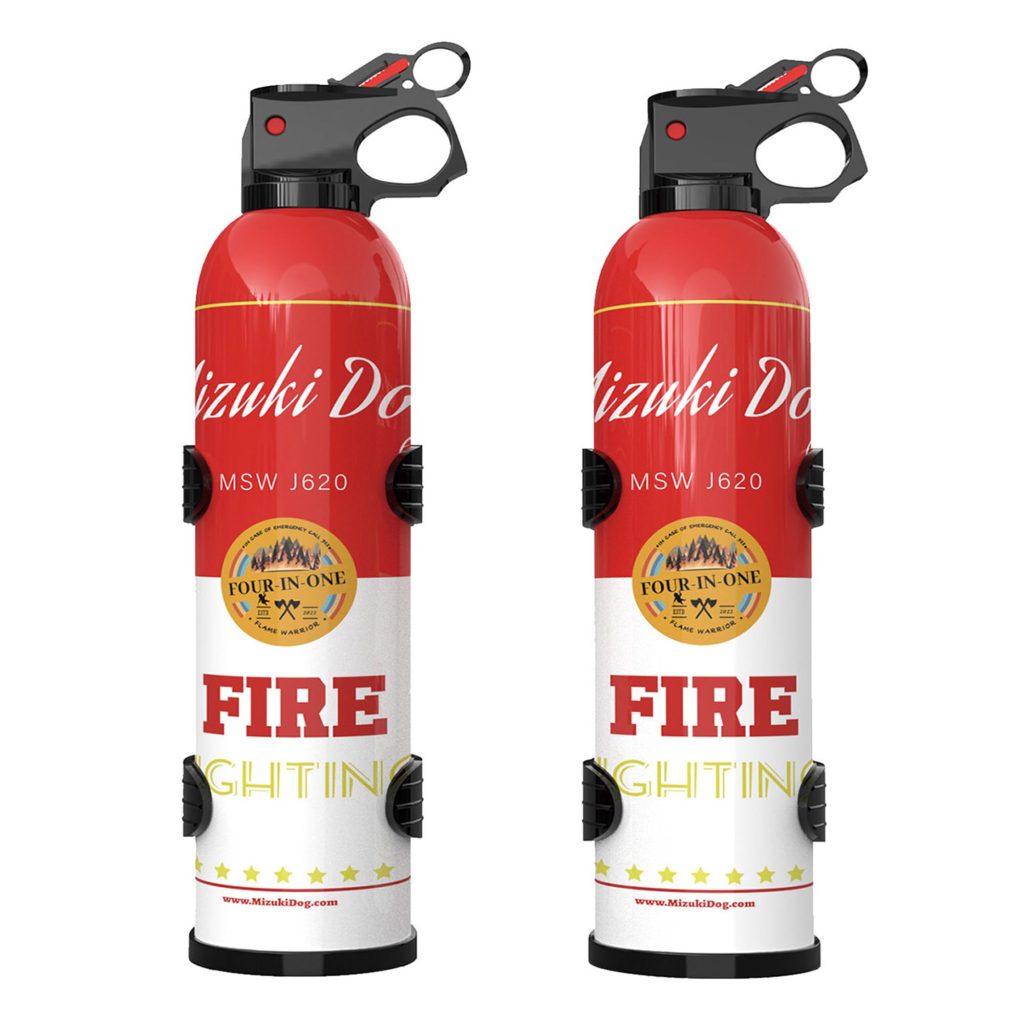Fire extinguisher powder can be toxic to dogs if ingested or inhaled in large amounts. Immediate veterinary attention is necessary if exposure occurs.
Fire extinguishers are essential safety tools, but they can pose risks to pets. Dogs are curious by nature and may come into contact with the powder if a fire extinguisher is used in the home. The chemicals in the powder can cause symptoms like vomiting, coughing, and difficulty breathing.
It’s crucial to store fire extinguishers out of pets’ reach and ensure they are used in well-ventilated areas. If your dog is exposed to fire extinguisher powder, contact your vet immediately. Quick action can prevent serious health issues and ensure your pet’s safety.

Introduction To Fire Extinguisher Powder
Fire extinguishers are crucial for safety. They help put out fires quickly. Many homes and offices use them. But, is the powder inside safe for dogs? This blog post will explore this concern. Let’s start by understanding what fire extinguisher powder is.
Types Of Fire Extinguishers
There are different types of fire extinguishers. Each type is designed for specific fires. Here are the main types:
- Water Extinguishers: Best for common fires like wood and paper.
- Foam Extinguishers: Effective on liquids like oil or petrol.
- CO2 Extinguishers: Used for electrical fires.
- Dry Powder Extinguishers: Versatile for various fires, including electrical.
Dry powder extinguishers are the focus here. These are popular in homes and cars.
Common Ingredients In Extinguisher Powder
The powder in fire extinguishers contains chemicals. These chemicals help to smother the fire. Common ingredients include:
| Ingredient | Description |
|---|---|
| Monoammonium Phosphate | Stops flames by removing oxygen. |
| Sodium Bicarbonate | Neutralizes the fire’s heat. |
| Potassium Bicarbonate | Similar to sodium bicarbonate, but more effective. |
These ingredients are not designed for ingestion. They can be harmful if inhaled or swallowed.
Potential Hazards Of Extinguisher Powder
Fire extinguisher powder can be dangerous to dogs. Knowing the risks helps keep your pet safe. Here are some potential hazards of extinguisher powder.
Chemical Composition Concerns
Extinguisher powders contain chemicals like sodium bicarbonate and potassium bicarbonate. These chemicals are harmful if ingested or inhaled by dogs. Other common ingredients include monoammonium phosphate and ammonium sulfate. Both can irritate a dog’s skin and eyes.
| Chemical | Potential Harm |
|---|---|
| Sodium Bicarbonate | Gastrointestinal upset |
| Potassium Bicarbonate | Respiratory distress |
| Monoammonium Phosphate | Skin irritation |
| Ammonium Sulfate | Eye irritation |
Inhalation And Ingestion Risks
Dogs may inhale powder particles, causing breathing problems. Inhalation can lead to coughing, sneezing, and wheezing. In severe cases, it can cause lung damage.
Ingestion of the powder is equally dangerous. A dog eating extinguisher powder may vomit or have diarrhea. Some chemicals in the powder can be toxic and cause more severe symptoms.
Watch out for these signs of exposure:
- Excessive drooling
- Labored breathing
- Red, swollen eyes
- Skin rashes
Taking quick action can help mitigate these risks. Always store fire extinguishers out of your dog’s reach. If exposure occurs, contact a vet immediately.
Examining The Toxicity For Dogs
Fire extinguishers are essential for safety. But, is the powder toxic to dogs? This section examines the health risks for your furry friends.
Immediate Health Effects
Dogs might inhale or lick fire extinguisher powder. This can cause several immediate health effects. They may cough, sneeze, or have trouble breathing. In some cases, they might vomit or have diarrhea.
Here is a table showing common immediate symptoms:
| Symptom | Description |
|---|---|
| Coughing | Frequent and harsh coughs |
| Sneezing | Repeated sneezes |
| Breathing Trouble | Heavy or rapid breathing |
| Vomiting | Throwing up food or liquid |
| Diarrhea | Loose or watery stools |
Long-term Health Implications
Long-term health risks are also a concern. Repeated exposure can lead to chronic respiratory issues. Dogs may develop bronchitis or other lung problems.
Listed below are the long-term health implications:
- Chronic Coughing
- Respiratory Infections
- Bronchitis
- Asthma-like Symptoms
Keeping your dogs safe from fire extinguisher powder is crucial. Be aware of both immediate and long-term health risks.

Case Studies And Veterinary Reports
Understanding the effects of fire extinguisher powder on dogs is crucial. Here, we explore documented incidents and research findings.
Documented Incidents
Veterinary reports highlight various cases involving dogs and fire extinguisher powder. These cases show how exposure affects dogs.
| Incident | Symptoms | Treatment |
|---|---|---|
| Inhalation | Coughing, difficulty breathing | Oxygen therapy |
| Skin Contact | Rashes, itching | Bathing, topical ointments |
| Ingestion | Vomiting, diarrhea | Induced vomiting, activated charcoal |
Research Findings
Studies have been conducted to understand the toxicity levels of fire extinguisher powder in dogs.
- Inhalation: Causes respiratory distress in dogs.
- Ingestion: Leads to gastrointestinal issues like vomiting.
- Skin Contact: Results in dermatitis and itching.
Research indicates that even small amounts can harm dogs. The chemicals in the powder irritate the respiratory system.
Veterinary advice: Always consult a vet if your dog is exposed. Prompt action can save your dog’s life.
First Aid Measures For Dogs
If your dog has been exposed to fire extinguisher powder, quick action is necessary. While not all fire extinguisher powders are toxic, some can cause irritation or other health issues. Here’s what you need to do to keep your dog safe.
Immediate Actions To Take
1. Remove Your Dog from the Area: Take your dog to a well-ventilated space. Fresh air can help reduce inhalation of the powder.
2. Rinse the Eyes and Mouth: Use clean water to rinse your dog’s eyes and mouth. This helps remove any irritants.
3. Brush Off the Powder: Use a soft brush to remove powder from your dog’s fur. Be gentle to avoid further irritation.
4. Offer Water: Provide fresh water for your dog to drink. This can help flush out any ingested powder.
When To Seek Veterinary Care
If your dog shows any signs of distress, seek veterinary care immediately. Here are some warning signs:
- Persistent coughing or difficulty breathing
- Excessive drooling or vomiting
- Red, irritated eyes
- Lethargy or unusual behavior
Contact your vet if you notice any of these symptoms. They can provide the best care for your dog.
| Symptom | Action |
|---|---|
| Difficulty breathing | Seek vet care immediately |
| Eye irritation | Rinse with water, then call vet |
| Vomiting | Offer water, call vet |
| Lethargy | Monitor, seek vet care if persists |
Keeping these first aid measures in mind can help ensure your dog stays safe and healthy.
Preventive Strategies For Dog Owners
Fire extinguisher powder can be harmful to dogs. Dog owners must take steps to keep their furry friends safe. Here are some strategies to help protect your dog from toxic fire extinguisher powder.
Safe Storage Of Fire Extinguishers
Proper storage of fire extinguishers is crucial. Keep fire extinguishers in a high place, out of reach of dogs. Store them in locked cabinets or secure areas. Ensure the storage area is cool and dry. Check the extinguisher regularly for leaks or damage.
Use a wall mount to hang fire extinguishers. This prevents dogs from knocking them over. Avoid storing extinguishers on the floor or low shelves. Educate family members about the importance of safe storage.
Training Dogs To Avoid Hazardous Materials
Training your dog can prevent accidental exposure to harmful substances. Teach basic commands like “leave it” and “stay away.” Reward your dog for obeying these commands. Use positive reinforcement to encourage good behavior.
Supervise your dog when they explore new areas. Keep an eye on them during walks and outdoor play. If your dog shows interest in dangerous items, redirect their attention. Provide safe toys and activities to keep them occupied.
Consider professional training if your dog continues to explore hazardous materials. A trained dog is less likely to get into dangerous situations. Consistent training can help keep your dog safe and healthy.
Legal And Regulatory Considerations
Understanding the legal and regulatory considerations about fire extinguisher powder is crucial. It ensures the safety of our pets and compliance with the law. Here, we will explore the standards and regulations for fire extinguisher contents and the liability in cases of pet poisoning.
Standards And Regulations For Fire Extinguisher Contents
Fire extinguisher contents are governed by strict standards. These standards aim to ensure safety and effectiveness.
- National Fire Protection Association (NFPA): Sets guidelines for fire safety.
- Occupational Safety and Health Administration (OSHA): Regulates workplace safety, including fire extinguishers.
Chemical composition of fire extinguisher powder must comply with these standards. This ensures it is safe for use in various environments.
Some common chemicals in fire extinguishers include:
| Chemical | Use |
|---|---|
| Sodium Bicarbonate | Used in Class B and C fires |
| Monoammonium Phosphate | Used in Class A, B, and C fires |
Liability In Cases Of Pet Poisoning
If a dog ingests fire extinguisher powder, legal liability may arise. Pet owners and manufacturers need to be aware of this.
- Pet Owners: Must ensure fire extinguishers are stored safely and out of pets’ reach.
- Manufacturers: Must label products clearly with safety warnings.
If a pet is poisoned, veterinary bills can be significant. Legal action may follow if negligence is proven.
Ensuring compliance with safety standards and proper usage can prevent such incidents.

Conclusion And Recommendations
Fire extinguisher powder can be harmful to dogs. Understanding its impact is important for every dog owner. This section summarizes key points and offers helpful advice.
Summary Of Key Points
- Fire extinguisher powder contains chemicals that can irritate dogs.
- Inhalation can cause breathing issues or other health problems.
- Ingestion might lead to stomach upset or toxic effects.
- Skin contact can result in irritation or allergic reactions.
- Quick action can minimize health risks.
Advice For Dog Owners
To keep your dog safe, follow these recommendations:
- Store Extinguishers Properly: Keep fire extinguishers out of your dog’s reach.
- Use Caution: Avoid using fire extinguishers around pets if possible.
- Ventilate: Ensure good ventilation if you use an extinguisher indoors.
- Clean Thoroughly: Clean up any residue immediately to prevent contact.
- Watch for Symptoms: Monitor your dog for signs of irritation or distress.
- Seek Veterinary Help: Contact your vet if your dog shows symptoms.
By following these tips, you can keep your dog safe from the harmful effects of fire extinguisher powder.
Frequently Asked Questions
Is Fire Extinguisher Powder Harmful To Dogs?
Yes, fire extinguisher powder can be toxic to dogs if ingested or inhaled.
What Should I Do If My Dog Ingests Fire Extinguisher Powder?
Seek immediate veterinary attention. Do not induce vomiting unless directed by a professional.
Can Fire Extinguisher Powder Cause Respiratory Issues In Dogs?
Yes, inhaling fire extinguisher powder can cause respiratory problems in dogs.
Conclusion
Fire extinguisher powder can be harmful to dogs. Always store fire extinguishers safely and use pet-friendly alternatives. Clean up any residue promptly. Consult a vet if your dog is exposed. Keep your furry friends safe by being cautious with fire safety equipment.
Your dog’s health should always be a priority.

